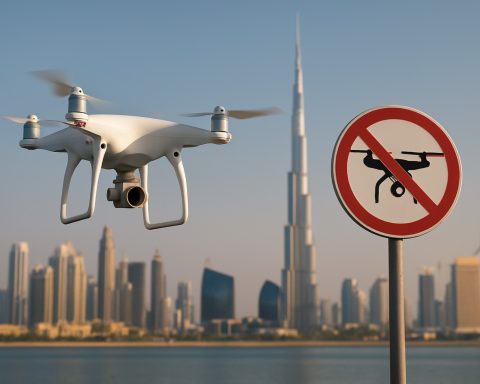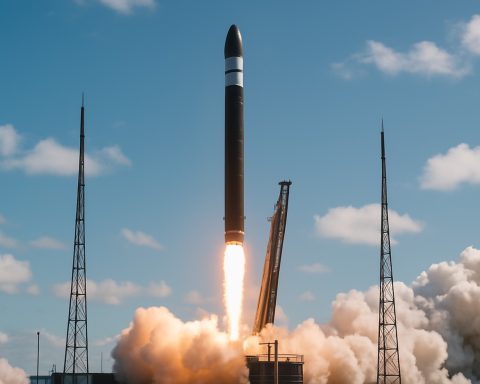Navigating Dubai’s Evolving Drone Laws: Essential Insights on Restrictions, Compliance, and Airspace Management
- Dubai’s Drone Market: Current Landscape and Key Drivers
- Emerging Technologies Shaping Drone Operations in Dubai
- Major Players and Market Dynamics in Dubai’s Drone Sector
- Projected Expansion and Investment Opportunities in Dubai’s Drone Industry
- Airspace Regulations and No-Fly Zones Across Dubai’s Districts
- Anticipated Regulatory Shifts and Market Evolution for Drones in Dubai
- Navigating Legal Hurdles and Unlocking Potential in Dubai’s Drone Ecosystem
- Sources & References
“SpaceX Offers $15 Starlink Plan in New York for Low-Income Residents” (source)
Dubai’s Drone Market: Current Landscape and Key Drivers
Dubai is poised for a significant transformation in its drone regulatory environment with the anticipated 2025 overhaul of its drone laws. As the emirate accelerates its ambitions to become a global smart city and logistics hub, the new rules are designed to balance innovation, safety, and privacy. The upcoming regulations are expected to impact both recreational and commercial drone operators, with a focus on stricter compliance, expanded no-fly zones, and streamlined licensing procedures.
- Stricter Registration and Licensing: The Dubai Civil Aviation Authority (DCAA) is set to introduce a unified digital platform for drone registration and pilot licensing. All drones, regardless of size or purpose, will require registration, and operators must pass updated competency tests. This move aims to curb unauthorized flights and ensure accountability (The National).
- Expanded No-Fly Zones: The 2025 shake-up will see an expansion of restricted airspace, particularly around critical infrastructure, government buildings, and densely populated areas. The DCAA will publish real-time interactive maps, accessible via mobile apps, to help operators avoid violations. Notably, areas near Dubai International Airport and Expo City will remain strictly off-limits (Khaleej Times).
- Mandatory Insurance and Data Protection: Commercial drone operators will be required to carry liability insurance and adhere to new data privacy standards, especially when capturing images or video in public spaces. This aligns with Dubai’s broader push for responsible tech adoption and citizen privacy (Gulf Business).
- Enforcement and Penalties: The DCAA is investing in advanced drone detection and countermeasure systems. Fines for unauthorized flights or breaches of no-fly zones are expected to increase, with repeat offenders facing potential criminal charges. In 2023, over 400 drone-related incidents were reported, underscoring the need for tighter controls (Arabian Business).
To stay legal, operators should regularly consult the DCAA’s official portal, use approved flight planning apps, and ensure all documentation is up to date. As Dubai’s drone market matures, compliance will be key to unlocking the sector’s full potential while safeguarding public safety and privacy.
Emerging Technologies Shaping Drone Operations in Dubai
Dubai is rapidly positioning itself as a global leader in drone integration, but with this growth comes a significant regulatory overhaul. The Dubai Civil Aviation Authority (DCAA) has announced a comprehensive update to its drone laws, set to take effect in 2025. These changes aim to balance innovation with public safety, privacy, and airspace management as drone usage surges across commercial, recreational, and governmental sectors.
- Expanded No-Fly Zones: The 2025 regulations will introduce new and expanded no-fly zones, particularly around critical infrastructure, government buildings, and densely populated areas. The National News reports that these zones will be dynamically updated using geofencing technology, automatically restricting drone operations in sensitive locations.
- Mandatory Registration & E-Identification: All drones, regardless of size or purpose, must be registered with the DCAA. Operators will be required to use electronic identification (e-ID) systems, enabling authorities to track and monitor drones in real time. This aligns with global trends, as seen in the EU and US, to enhance accountability and airspace safety (Gulf Today).
- Operator Certification & Training: The new laws will mandate formal training and certification for all drone pilots, including recreational users. The DCAA will roll out accredited training programs and online modules to ensure operators understand airspace rules, privacy laws, and emergency procedures.
- Integration with Dubai Sky Dome: The updated framework will leverage the Dubai Sky Dome platform, a digital air traffic management system for drones. This will facilitate automated flight approvals, real-time tracking, and seamless coordination with manned aviation.
To stay legal, drone operators must:
- Register their drones and obtain e-ID before flight.
- Check the latest no-fly zones via official apps or the DCAA website.
- Complete mandatory training and carry proof of certification.
- Use only approved flight paths and comply with altitude restrictions.
Non-compliance will result in hefty fines, drone confiscation, and potential legal action. As Dubai’s drone ecosystem evolves, staying informed and compliant is essential for safe and legal operations in 2025 and beyond.
Major Players and Market Dynamics in Dubai’s Drone Sector
Dubai’s drone sector is undergoing a significant transformation as the emirate prepares to implement a comprehensive overhaul of its drone regulations in 2025. The new legal framework, announced by the Dubai Civil Aviation Authority (DCAA), aims to balance rapid technological adoption with public safety, privacy, and airspace security. This regulatory shake-up is expected to have a profound impact on both commercial operators and hobbyists, as well as on the broader market dynamics.
- Key Regulatory Changes: The 2025 drone law introduces stricter licensing requirements for commercial drone operators, mandatory registration for all drones above 250 grams, and enhanced pilot training standards. Operators must now obtain a Remote Pilot License (RPL) and pass a background check. The DCAA will also require real-time flight tracking for drones operating in urban areas (The National).
- No-Fly Zones Expansion: The updated regulations expand existing no-fly zones to include sensitive government buildings, major tourist attractions, and densely populated residential districts. The airspace around Dubai International Airport and Al Maktoum International Airport remains strictly off-limits, with geofencing technology mandated for all new drones sold in the emirate (Khaleej Times).
- Market Impact: These changes are expected to drive consolidation among drone service providers, as compliance costs rise and smaller operators may struggle to meet the new standards. However, the clearer regulatory environment is likely to attract international players and investors, particularly in sectors such as logistics, construction, and aerial surveying. According to a recent report, Dubai’s commercial drone market is projected to grow at a CAGR of 14% through 2028, reaching a value of $1.2 billion (Mordor Intelligence).
- Staying Legal: To remain compliant, operators must register their drones with the DCAA, adhere to designated flight corridors, and obtain special permits for night operations or flights above 120 meters. The DCAA has launched an updated online portal for registrations and permit applications, streamlining the process for both individuals and businesses (Dubai Civil Aviation Authority).
As Dubai positions itself as a global leader in drone innovation, the 2025 regulatory overhaul is set to shape the sector’s future, fostering responsible growth while safeguarding the city’s skies.
Projected Expansion and Investment Opportunities in Dubai’s Drone Industry
Dubai is poised for a significant transformation in its drone industry as the emirate prepares to implement a comprehensive overhaul of its drone regulations in 2025. The new legal framework, announced by the Dubai Civil Aviation Authority (DCAA), aims to balance rapid technological adoption with public safety, privacy, and airspace management. This regulatory shake-up is expected to unlock substantial investment opportunities and accelerate the expansion of commercial drone applications across sectors such as logistics, real estate, construction, and public safety.
- Key Regulatory Changes: The 2025 drone law will introduce a tiered licensing system, stricter operator training requirements, and mandatory insurance for commercial drone activities. Notably, the DCAA will expand and update the list of no-fly zones to include sensitive infrastructure, government buildings, and densely populated areas. The new rules will also require real-time flight tracking and geofencing technology for all drones above a certain weight threshold.
- Market Impact: Dubai’s drone market is projected to grow at a CAGR of over 15% through 2028, driven by regulatory clarity and government-backed initiatives such as the Dubai Sky Dome project, which aims to create a digital airspace infrastructure for unmanned aerial vehicles (UAVs). The new legal environment is expected to attract both local startups and international drone manufacturers seeking a foothold in the Middle East.
- Investment Opportunities: The regulatory overhaul opens doors for investment in drone fleet management, airspace security solutions, and drone data analytics. Venture capital interest is rising, with the UAE’s drone sector attracting over $50 million in funding in 2023 alone (Arabian Business). Real estate, e-commerce, and smart city projects are expected to be early adopters of compliant drone technologies.
- Staying Legal: Operators must register all drones with the DCAA, obtain the appropriate licenses, and adhere to updated no-fly zone maps. The DCAA will launch a new digital portal for permit applications and real-time flight approvals, streamlining compliance for both hobbyists and commercial users (DCAA).
As Dubai’s drone law shake-up takes effect in 2025, stakeholders who proactively adapt to the new regulatory landscape will be best positioned to capitalize on the emirate’s burgeoning drone economy.
Airspace Regulations and No-Fly Zones Across Dubai’s Districts
Dubai’s drone landscape is set for a significant transformation in 2025, as authorities roll out a comprehensive overhaul of airspace regulations. The new framework, spearheaded by the General Civil Aviation Authority (GCAA) and the Dubai Civil Aviation Authority (DCAA), aims to balance innovation with public safety, privacy, and national security. Here’s what drone operators and enthusiasts need to know about the upcoming changes, no-fly zones, and compliance requirements.
- Expanded No-Fly Zones: The 2025 regulations will see a significant expansion of restricted airspace. In addition to existing bans around airports, royal palaces, and military sites, new no-fly zones will cover densely populated districts such as Downtown Dubai, Dubai Marina, and Expo City. Sensitive infrastructure—including the Burj Khalifa, Dubai Metro, and major highways—will also be off-limits. The updated Dubai Drone Zone Map will provide real-time guidance for operators.
- Mandatory Registration and E-Identification: All drones, regardless of size or purpose, must be registered with the GCAA. Operators will be required to install electronic identification modules, enabling authorities to track drones in real time. This move aligns with global trends in drone regulation, as seen in the EU and US (EASA, FAA).
- Operator Licensing and Training: Commercial and recreational pilots must complete certified training and pass a knowledge test on airspace rules, privacy, and emergency procedures. The DCAA will issue digital operator licenses, valid for two years.
- Strict Penalties for Violations: Fines for unauthorized flights in restricted zones will increase to up to AED 50,000, with potential confiscation of equipment and criminal charges for repeat offenders (Khaleej Times).
To stay legal, drone users should regularly consult the official drone zone map, keep their registration and licenses up to date, and avoid flying near sensitive sites. The 2025 shake-up underscores Dubai’s commitment to safe, responsible drone integration as the city advances its smart mobility and urban air mobility ambitions.
Anticipated Regulatory Shifts and Market Evolution for Drones in Dubai
Dubai is poised for a significant transformation in its drone regulatory landscape in 2025, reflecting the emirate’s ambition to become a global leader in smart mobility while ensuring public safety and airspace security. The Dubai Civil Aviation Authority (DCAA) has announced a comprehensive overhaul of drone laws, set to take effect in early 2025, that will impact both recreational and commercial drone operators.
- New Registration and Licensing Requirements: All drone operators—individuals and businesses—will be required to register their drones and obtain updated licenses through the DCAA’s digital platform. The new system will include mandatory training modules and stricter background checks, aiming to reduce unauthorized drone activity (Khaleej Times).
- Expansion of No-Fly Zones: The 2025 regulations will expand existing no-fly zones, particularly around critical infrastructure, government buildings, and densely populated areas. The updated interactive map, to be released by the DCAA, will integrate real-time geofencing technology, automatically restricting drone flights in sensitive zones (The National).
- Commercial Drone Corridors: In a bid to foster innovation, Dubai will introduce designated “drone corridors” for commercial operations, including delivery, surveying, and emergency response. These corridors will be equipped with advanced air traffic management systems, supporting the emirate’s vision for urban air mobility (Gulf Business).
- Penalties and Enforcement: The new framework will introduce steeper fines and potential criminal charges for violations, including unauthorized flights and privacy breaches. The DCAA will deploy AI-powered monitoring systems to detect and intercept rogue drones, ensuring robust enforcement.
For drone operators, staying compliant will require proactive adaptation: registering devices, adhering to updated flight maps, and participating in mandatory training. The regulatory shake-up is expected to boost investor confidence in Dubai’s drone sector, projected to reach a market value of $1.5 billion by 2027 (Zawya). As Dubai balances innovation with safety, these changes will shape a more structured and secure environment for drone technology in the region.
Navigating Legal Hurdles and Unlocking Potential in Dubai’s Drone Ecosystem
Dubai is poised for a significant transformation in its drone regulatory landscape with the anticipated 2025 overhaul of its drone laws. As the emirate accelerates its ambitions to become a global smart city and logistics hub, the new rules are designed to balance innovation with public safety and privacy concerns. Here’s what stakeholders need to know about the upcoming changes, the expansion of no-fly zones, and strategies for compliance.
- Comprehensive Registration and Licensing: The 2025 regulations will require all drone operators—commercial and recreational—to register their devices with the General Civil Aviation Authority (GCAA) and obtain operator permits. This move aims to enhance traceability and accountability, especially as drone deliveries and aerial services proliferate.
- Expansion of No-Fly Zones: Dubai’s new drone map will see an expansion of restricted airspace, particularly around critical infrastructure, government buildings, and densely populated areas. The Dubai Civil Aviation Authority (DCAA) is expected to introduce dynamic geofencing technology, automatically preventing drones from entering sensitive zones. Violations could result in hefty fines or criminal charges.
- Mandatory Insurance and Data Protection: Operators will be required to carry liability insurance and adhere to strict data privacy protocols, especially when drones are equipped with cameras or sensors. The new rules align with the UAE’s broader data protection framework, ensuring that aerial data collection does not infringe on individual privacy rights (Lexology).
- Pathways for Commercial Innovation: While the regulations are tightening, Dubai is also streamlining approval processes for commercial drone applications in logistics, surveying, and emergency response. The Dubai Sky Dome initiative is a key enabler, providing a digital platform for real-time flight approvals and airspace management.
To stay legal, operators should regularly consult the GCAA and DCAA websites for updates, use approved drone management apps, and participate in certified training programs. As Dubai’s drone ecosystem matures, proactive compliance will be essential for unlocking the sector’s full potential while avoiding costly legal pitfalls.
Sources & References
- Dubai’s Drone Law Shake-Up 2025: New Rules, No-Fly Zones & How to Stay Legal
- The National
- Khaleej Times
- Gulf Business
- Gulf Today
- Mordor Intelligence
- DCAA
- Dubai Civil Aviation Authority (DCAA)
- GCAA
- EASA
- Lexology







